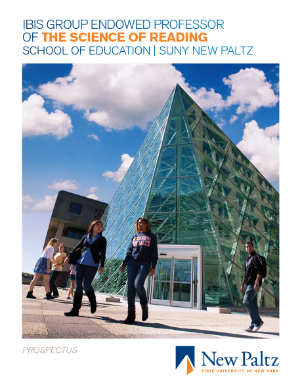-791x408.jpg)
A great science teacher inspires students to ask profound questions about the world around them, and seek out answers for themselves. In a rapidly changing society that depends on technology like never before, quality science teachers are in high demand in nearly every area of the country.
The Undergraduate Adolescence Education Competency-Based Teacher Education ProgramOutline of Education Course Requirements for Adolescence Education (Grades 7-12) Initial Certification.
Admission Requirements to the Program
- 3.0 overall GPA in College course work
- >Grade of B or better in Basic Communication course(s).
- Complete the undergraduate program application
Requirements for Student Teaching*
- Grade of B or better in Methods Course
- Approval of Coordinator and Chair
Student Teaching is a capstone experience for all undergraduate teacher candidates seeking a bachelor's degree. It is a full-time commitment extending for an entire semester with placements in two different settings. The School of Education requires that all required coursework is completed BEFORE the capstone experience begins, and it restricts candidates from taking any other course(s) while registered for Student Teaching except the co-requisite fieldwork 3 and the Student Teaching Seminar.
Adolescence Education students must have a 3.0 GPA to register for the Methods course in their academic discipline. Students unable to meet this GPA prerequisite will be advised to change their major so they can graduate in a timely manner.
*These requirements are baseline only. Education program enrollments can be more competitive, depending on the number of applicants.
Rewarding Careers in High Demand
As school districts continue to modernize, science, technology, and math teachers are among their greatest areas of need. Children in the 21st century need strong STEM education in order to succeed as professionals and as citizens. Talented and compassionate science teachers have a unique opportunity to make a difference that lasts a lifetime.
Work with Experts in Teaching and Science
The curriculum focuses on core pedagogical concepts and methods, complemented by upper-division electives taught by School of Science & Engineering faculty—highly respected scholars teaching small classes, who are passionate about preparing new educators to work with diverse populations of children.
Develop your Teaching in the Real-World
This program includes a full-semester student teaching capstone experience, giving teacher candidates a valuable opportunity to hone their craft with one of our many partner districts, including partners in New York City and Long Island. Student teachers are supported by faculty advisors on campus and professional mentors in the field, who strive to ensure that all graduates are ready to lead a classroom on day one.
Required Couplings:
- Intro Curriculum & Assessment and Field Work #1
- Methods, Field Work #2 and Digital Environment
- Student Teaching, Student Teaching Seminar and Field Work #3
Recommended Couplings:
- Sociological & Philosophical Foundations of Education and Developing Adolescent
- Intro to Literacy for Diverse Learners and Differentiating Instruction in the Secondary School
…………………………………………………..
PROGRAM INFORMATION
Latanya Brandon, Program Coordinator
brandonl@newpaltz.edu or 845-257-3118
…………………………………………………..
Admission to the Undergraduate Adolescence Science Program requires a 3.0 GPA in college course work, and a B or better in Composition I & II. The Adolescence Science Education program includes the following Education courses (41 credits):
Required Courses
Educational Foundations Courses (13 credits)
- EDS340 Sociological & Philosophical Foundations
- EDS372 Developing Adolescent
- SED354 Foundations Seminar
- EDS383 Literacy for Diverse Learners
- SPE385 Differentiating Instruction
Science Education Pedagogy & Practice (12 credits)
- SED453 Intro to Curriculum & Instruction
- SED356 Teaching & Learning in the Digital Environment
- SED374 Teaching Science in the Secondary School
To prepare future Science teachers, our candidates get real-world, hands-on experiences through the following clinical experiences:
Clinically Rich Experience Courses (16 credits)
- SED353 Fieldwork I
- SED350 Fieldwork II
- SED407 Fieldwork III
- SED404 Student Teaching in the Middle School
- SED405 Student Teaching in the High School
- SED406 Student Teaching Seminar
In addition to these educational foundations, pedagogy, and clinical practice courses, the program requires the completion of one of the following Science cognate programs:
Biology (59-64 credits)
- Biology courses (28-33 credits)
- Cognate courses (Chemistry, Physics, and/or Math, 31 credits)
Chemistry (55 credits)
- Chemistry courses (32 credits)
- Cognate courses (Biology, Physics, Geology, and Math, 23 credits)
Earth Science (58-59 credits)
- Geology courses (35 credits)
- Cognate courses (Chemistry, Physics, Biology, Computer Science, and Math, 23-24 credits)
Physics (53 credits)
- Physics courses (30 credits)
- Cognate courses (Math and Chemistry, 23 credits)
Transportation
Students are responsible for their own transportation to field and student teaching placements and must be prepared to commute up to 45 miles, one way, to these placements.
Additional Requirements:
Additional requirements for New York State Teaching and Leadership Certification can be found at the SUNY New Paltz Certification Advising web site. This site includes information on mandatory workshops, fingerprinting, certification exams, and more.
Moral Character
Students must have good moral character. Applicants for admission are asked to provide information about past convictions, misconduct, etc. on the application for a certificate, and the New York State Education Department is authorized to investigate complaints regarding an applicant's past convictions which raise a reasonable question as to the individual's moral character.








